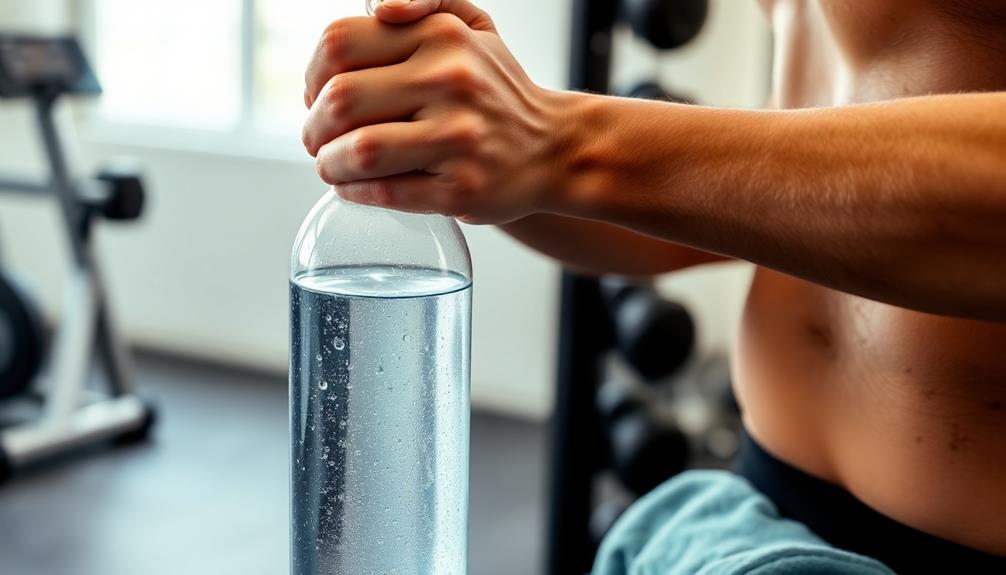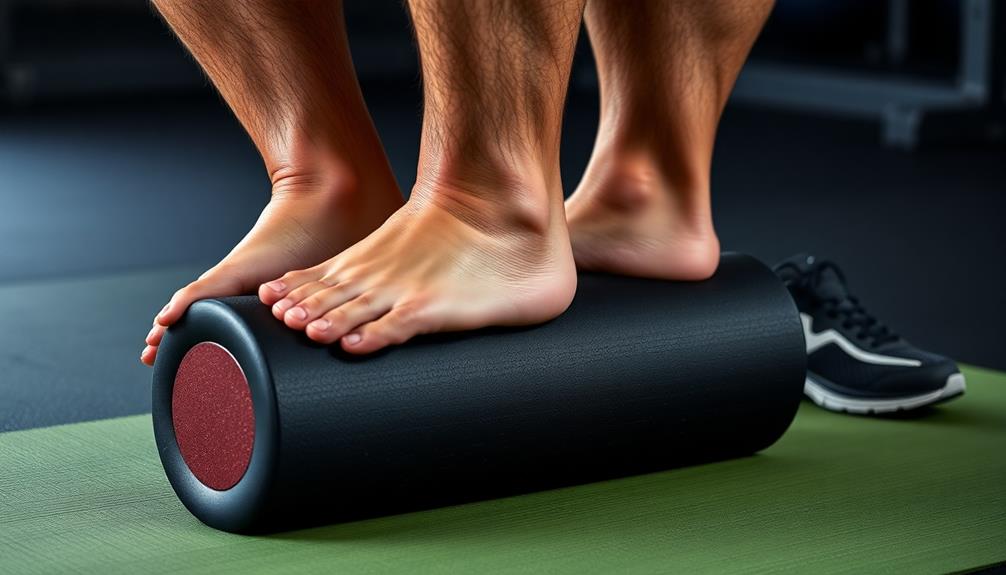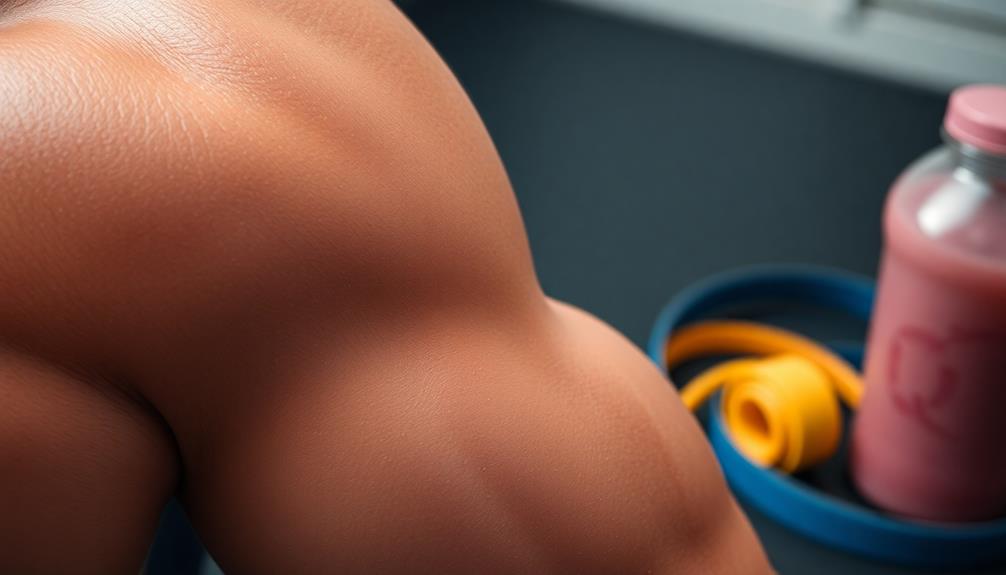To enhance muscle repair after resistance training, focus on these five key areas: First, prioritize post-workout nutrition by consuming protein and carbs within an hour of your workout. Second, get adequate sleep, aiming for 7-9 hours nightly to support hormone production. Third, incorporate active recovery with low-intensity activities between workouts. Fourth, stay hydrated throughout the day to aid nutrient transport and waste removal. Finally, consider foam rolling to reduce muscle tension and improve flexibility. By implementing these strategies, you'll support your body's recovery process and maximize your strength gains. Let's explore each tip in more detail to optimize your post-workout recovery routine.
Core Insight
- Consume protein and carbs within an hour after workout to support muscle repair and growth.
- Get 7-9 hours of quality sleep nightly to optimize hormone release for muscle recovery.
- Incorporate active recovery exercises like walking or yoga between intense workouts to aid healing.
- Stay hydrated by drinking water throughout the day to transport nutrients and remove waste from muscles.
- Use foam rolling to reduce muscle tension, increase flexibility, and speed up recovery after resistance training.
Prioritize Post-Workout Nutrition

After your workout, eat a meal or snack within an hour. This helps your muscles recover and refills your energy. Look for foods with protein and carbs. Protein rebuilds muscle, while carbs restock your fuel. Aim for 20-30 grams of protein from sources like meat, eggs, or plants. For carbs, choose whole grains, sweet potatoes, or fruit. Try to eat about 3 or 4 times more carbs than protein. Post-workout nutrition is key for reaching your fitness goals.
Get Adequate Sleep

Sleep is essential for muscle repair. Your body releases growth hormone during deep sleep, which helps regenerate and grow muscle tissue. Aim to get 7-9 hours of quality sleep each night. If falling asleep is difficult, try natural remedies like lavender or chamomile tea before bed.
To sleep better, create a consistent bedtime routine and make your bedroom cool, dark, and quiet. Avoid using electronic devices at least an hour before bed, as the blue light can disrupt your sleep cycle. Try relaxation techniques like deep breathing or meditation to help you unwind.
If you can't get enough sleep at night, consider taking short naps during the day to reduce fatigue and support muscle recovery. Remember, consistent, quality sleep is just as important as workouts and nutrition for optimal muscle repair and growth.
Incorporate Active Recovery

Active recovery is a great way to help your muscles heal and get fitter. Instead of just resting, do low-intensity activities that get your blood moving and make your muscles less sore. This helps you recover faster and gets your body ready for your next workout.
Try these active recovery activities:
| Activity | Duration | Intensity |
|---|---|---|
| Walking | 20-30 min | Low |
| Swimming | 15-20 min | Low |
| Yoga | 30-45 min | Low |
| Cycling | 20-30 min | Low |
Pick activities you like that don't put too much stress on your muscles. Try to do active recovery between your harder workouts. This will help you stay fit, make you more flexible, and lower your chances of getting hurt. Active recovery should make you feel refreshed, not tired.
Stay Hydrated

Drinking enough water is crucial for repairing and recovering your muscles. Water transports nutrients to your muscles and removes waste. To stay hydrated, drink water throughout the day, not just during exercise. Coconut water is a great option besides plain water. It has natural electrolytes and potassium to keep you hydrated and your muscles working well. Good brands are Zico, CoAqua, and MOJO, which have a lot of nutrients and not much added sugar.
Try to drink 8-10 glasses of water per day, but you may need more or less depending on your size, how active you are, and the weather. Don't wait until you're thirsty to drink since that means you're already a bit dehydrated. Check your urine color; pale yellow means you're probably well-hydrated. After tough workouts, drink something with electrolytes to replace minerals lost in sweat and keep your muscles working their best.
Consider Foam Rolling

Foam rolling is a great way to help your muscles recover after a workout. It can reduce muscle tension and make you more flexible. After exercising, try using a foam roller on your major muscle groups for 30-60 seconds each. Firm foam rollers work best for deep tissue massage, providing strong pressure on specific muscles.
Begin with large muscles like your thighs, hamstrings, and back. Roll slowly, stopping on tight spots. Press down steadily, but not so hard that it hurts. If you find a really tight area, hold the roller there for 20-30 seconds to release the tension.
Using a foam roller regularly can help you move better, feel less sore, and recover faster. It's a great addition to your post-workout routine to support your body's natural healing process.
Frequently Asked Questions
How Long Should I Wait Before Training the Same Muscle Group Again?
You should generally wait 48-72 hours before training the same muscle group again. This allows for adequate recovery and muscle repair. However, your specific rest period may vary depending on your fitness level and workout intensity.
Can Massage Therapy Speed up Muscle Recovery?
Yes, massage therapy can speed up your muscle recovery. It improves blood flow, reduces inflammation, and helps break down scar tissue. You'll experience less soreness and stiffness, allowing you to return to training sooner.
Are Cold Water Immersion Baths Effective for Muscle Repair?
You'll find cold water immersion baths can be effective for muscle repair. They'll reduce inflammation and muscle soreness, potentially speeding up recovery. However, their impact on long-term muscle adaptation is debated, so use them judiciously in your routine.
Do Anti-Inflammatory Medications Help or Hinder Muscle Recovery?
You'll find mixed results with anti-inflammatory medications for muscle recovery. While they can reduce pain, they might hinder the natural healing process. It's best to use them sparingly and consult your doctor for personalized advice.
How Does Age Affect Muscle Repair and Recovery Time?
As you age, your muscle repair and recovery time slow down. You'll notice it takes longer to bounce back after workouts. Your body's ability to synthesize proteins decreases, and hormonal changes can impact your muscle-building capacity.

